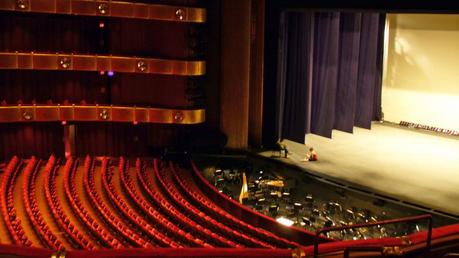
The former New York State Theater, no longer home to the New York City Opera.
Photo by David Shankbone © Wikimedia Commons.
The company has struggled in recent seasons to sell tickets and fill seats. The move comes as a last-ditch maneuver to save on the opera company's budget and salvage what is left of their endowment. In an article in the New York Times, company officials stated that moving out of their longtime home will save them $4.5 million this season.
The City Opera has a long, proud history. Founded in 1943 as the "people's alternative" to the ritzy Metropolitan Opera, the company served as a laboratory for obscure repertory, including Douglas Moore's American Opera The Ballad of Baby Doe, Leonard Bernstein's Candide and A Quiet Place and a haven for bel canto stars like the legendary diva Beverly Sills.
A move to Lincoln Center in 1966 proved problematic, as the company found itself in the New York State Theater, a venue designed with muffled acoustics to cater to dance, not opera. Still, singers like Placído Domingo, Norman Triegel, and more recently, Lauren Flanigan trod its boards, as the company presented funky "alternative" stagings of familiar works by Verdi and Puccini. But the good times wouldn't last.
The reasons for the failure are manifold. You could add up the deaths of many past donors, the poor economy, the drop in arts donations by greedy banks and corporations to create a ledger of red operatic ink. The closing of their theater for acoustical renovations in 2008 didn't help. But the gut-kick was the disastrous, aborted term of would-be general manager Gerard Mortier, who left the company rudderless when he decided to stay in Europe. All this plus spiralling orchestra and stagehand costs combined to eat the company's endowment in that dark season and make the once-proud company a shell of its past self.
In 2009, City Opera returned under the leadership of general manager George Steel, with a modest schedule of five operas. The company put on five operas in 2010 as well, but poor marketing decisions and obscure repertory choices failed to attract an audience. The choice of the obscure, modernist Monodramas and a presentation of Stephen Schwartz' Séance on a Wet Afternoon served as the one-two knockout. Mr. Schwartz' Broadway pedigree caused critics to sneer and a confused marketing campaign kept audiences away in droves.
Mr. Steel is expected to reveal a modest 5-opera season for next year, with three works performed in a small venue and two large-scale opera productions in what he says is an "unorthodox" space. No announcements of schedule or repertory have been made.
The announcement came after two days of white-knuckle business meetings in an effort to get out of its current, dire financial straits. The company is the first major arts organization to depart from Lincoln Center. No announcement has been made about how the empty calendar dates will be filled.

